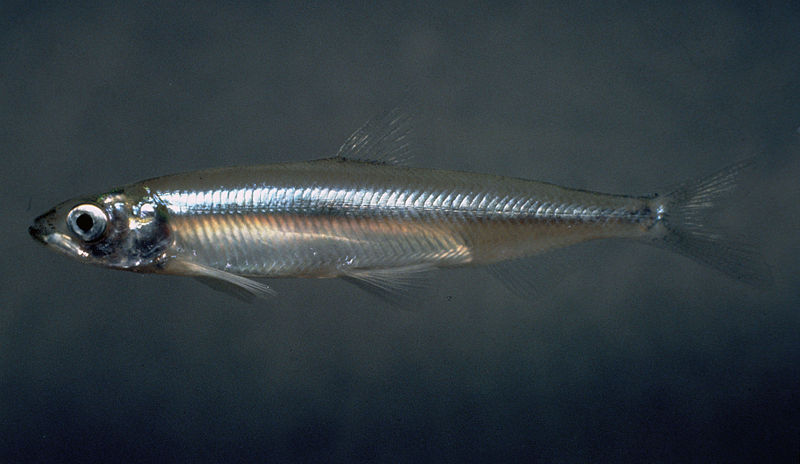
Excerpted from: DAN LEVINE, Reuters*
Photo: Hypomesus transpacificus (Delta Smelt), Wikipedia
A California appeals court sided with environmentalists over growers TODAY and upheld federal guidelines that limit water diversions to protect Delta smelt, in a battle over how the state will cope with its worst drought in a century.
The 9th U.S. Circuit Court of Appeals ruled that a lower court should not have overturned recommendations that the state reduce exports of water from north to south California. The recommendations leave more water in the Sacramento Delta for the finger-sized fish and have been blamed for exacerbating the effects of drought on humans.
The 2008 report by the U.S. Fish and Wildlife Service, which concluded that the fish’s existence was threatened, recommended limited exports of water to farmers and southern California. Farmers and allies sued, and a lower court called the federal biological opinion “arbitrary and capricious.”
Reaction from both sides was swift in the national political issue. In a blog post, Damien Schiff, an attorney for growers, said the ruling “bodes ill for farmers, farm laborers and millions of other Californians dependent on a reliable water supply.”
Efforts to save the Delta smelt, which lives only in the wetlands stretching north of San Francisco, have been described as a human vs. fish battle.
Kate Poole, a senior attorney for the Natural Resources Defense Council, said growers’ hopes of taking more water out of the Delta wouldn’t solve California’s problems.
“It’s the drought, not the Delta, that’s affecting the water supply this year,” Poole said in a statement. “While we can’t make it rain, we can take charge of our water use by investing in smart water practices that protect and preserve our water supply.”
However, in TODAY’S opinion, 9th Circuit Judge Jay Bybee, an appointee of President George W. Bush, ruled that the lower court should have been more deferential to the Fish and Wildlife Service.
“We recognize the enormous practical implications of this decision,” Bybee wrote. “But the consequences were prescribed when Congress determined that ‘these species of fish, wildlife, and plants are of esthetic, ecological, educational, historical, recreational, and scientific value to the Nation and its people.'”
Paul Weiland, an attorney who represented Kern County Water Agency and a coalition of Central Valley water users in the case, said he hopes the ruling will clear the way for all sides to come together and make progress on the Bay Delta Conservation Plan.
The plan seeks to restore the Sacramento-San Joaquin Delta ecosystems and secure California water supplies into the future. A draft of the plan is currently open for public comment.
Progress of the plan could be delayed if one or more of the parties in the case ask the 9th U.S. Circuit Court of Appeals to rehear the case or ask for a Supreme Court review, Weiland said.
Thursday’s ruling could also pave the way for a ruling in another pending case regarding the water needs of wild salmon and steelhead trout in the state, which involves many of the same players. A February hearing on that case was postponed until after the Delta smelt decision was handed down.
*(Reporting by Dan Levine; Additional reporting by Rory Carroll; Editing by Stephen Powell, Peter Henderson and Richard Chang)








